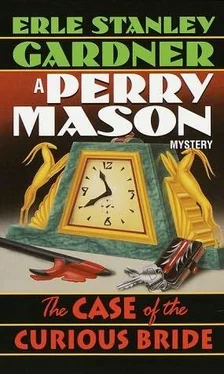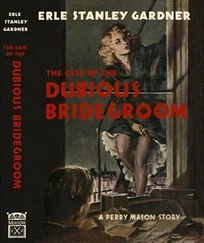Эрл Гарднер - The Case of the Curious Bride
Здесь есть возможность читать онлайн «Эрл Гарднер - The Case of the Curious Bride» весь текст электронной книги совершенно бесплатно (целиком полную версию без сокращений). В некоторых случаях можно слушать аудио, скачать через торрент в формате fb2 и присутствует краткое содержание. Жанр: Детектив, на английском языке. Описание произведения, (предисловие) а так же отзывы посетителей доступны на портале библиотеки ЛибКат.
- Название:The Case of the Curious Bride
- Автор:
- Жанр:
- Год:неизвестен
- ISBN:нет данных
- Рейтинг книги:4 / 5. Голосов: 1
-
Избранное:Добавить в избранное
- Отзывы:
-
Ваша оценка:
- 80
- 1
- 2
- 3
- 4
- 5
The Case of the Curious Bride: краткое содержание, описание и аннотация
Предлагаем к чтению аннотацию, описание, краткое содержание или предисловие (зависит от того, что написал сам автор книги «The Case of the Curious Bride»). Если вы не нашли необходимую информацию о книге — напишите в комментариях, мы постараемся отыскать её.
The Case of the Curious Bride — читать онлайн бесплатно полную книгу (весь текст) целиком
Ниже представлен текст книги, разбитый по страницам. Система сохранения места последней прочитанной страницы, позволяет с удобством читать онлайн бесплатно книгу «The Case of the Curious Bride», без необходимости каждый раз заново искать на чём Вы остановились. Поставьте закладку, и сможете в любой момент перейти на страницу, на которой закончили чтение.
Интервал:
Закладка:
Judge Markham turned to counsel. "I am aware," he said, "that the legislature sought to expedite trials by providing that the Court should examine prospective jurors, and that this examination might be supplemented by questions asked by counsel. I am equally aware that within certain limits of propriety, an examination by counsel is far more efficacious than interrogations by the Court for the purpose of ascertaining the qualifications of jurors. The defense may inquire."
Judge Markham settled back in his seat, nodded to Mason.
Perry Mason got to his feet, turned to face the first juror who had been called to the box. "Mr. Simpson," he said, calling the juror by name, "you have stated that you can fairly and impartially act as a juror in this case?"
"Yes, sir."
"You have no bias, no prejudice one way or the other?"
"No, sir."
"You feel that you can treat the defendant in this case with fair impartiality?"
"I do."
Perry Mason's voice rose. His hands flung out in a dramatic gesture.
"In what I am about to say, Mr. Simpson," he said, "there is no personal implication; it is a question which I consider it my duty to ask on behalf of my client. It is a question which is necessitated by reason of the fact that legal histories fairly swarm with instances in which circumstantial evidence has brought about convictions predicated upon a fortuitous chain of circumstances, circumstances which have subsequently been completely clarified and found to have no sinister significance whatever, yet circumstances which have, in the meantime, resulted in the conviction of an innocent person. Therefore, I ask you, Mr. Simpson, if through some fortuitous chain of circumstances, you should find yourself unlucky enough to be placed in the chair now occupied by the defendant, charged with the crime of murder in the first degree, would you, or would you not, be willing to trust your fate in the hands of twelve persons who felt toward you as you now feel toward the defendant?"
The dazed juror, listening to the dramatic array of words, getting the general idea without the specific meaning of each and every word impressing itself upon him, slowly nodded his head.
"Yes," he said.
Perry Mason turned to the other members of the jury. "Is there any member of this jury," he said, "who would not answer that question as Mr. Simpson has answered it? If so, hold up your hand."
The other jurors had been waiting for the time when they would be singled out for a verbal heckling. Suddenly dazed by this swift turn of events, they looked from one to the other for mutual support. None of them fully understood the question. None of them felt like making himself conspicuous by holding up his hand.
Perry Mason turned to the Court with a triumphant smile. "Under the circumstances, your Honor, we could ask for nothing better than this jury. Pass for cause."
John Lucas jumped to his feet, his voice incredulous. "You mean," he asked, "that you're passing for cause in a murder case with no more examination than this?"
Judge Markham banged his gavel. "You heard the remark of counsel, Mr. Lucas," he said. But even the eyes of the magistrate sought Perry Mason's face in puzzled speculation. Judge Markham had seen enough of Mason's swift strategy in court to realize that the lawyer was playing for some master stroke, but he could not anticipate just what it was in this case.
John Lucas took a deep breath, swung his chair around and said, "Very well."
"You may examine the jurors," said Judge Markham.
And John Lucas proceeded to examine the jurors in detail. Very obviously he thought that Perry Mason had «planted» some very friendly person on that jury. Knowing the reputation of the man against whom he was pitted, Lucas saw no alternative other than to smoke this friendly juror out into the open; and he proceeded throughout the course of an interminably long afternoon to question the jurors as to their fairness and impartiality. And slowly the conviction was built up in the courtroom that Perry Mason, for the defense, had been satisfied to take the jurors' word for the fact that they were fair and impartial, but that the district attorney's office must heckle and browbeat them in an attempt to prove that they were liars. Before the afternoon had finished there was a distinct attitude of snarling hostility creeping into the manner of John Lucas.
Slowly Judge Markham's face relaxed. Once or twice, at some particularly flagrant example of mutual distrust between the questioner and the jurors, his face almost twisted into a smile, and, at time of the evening adjournment, he looked at Perry Mason with twinkling eyes.
John Lucas was still nagging at the jurors the next morning. By eleven o'clock he finished and passed for cause. Moreover, Lucas showed a recognition of the losing battle he had been waging by excusing four of the jurors under peremptory challenges. Whereas Perry Mason not only waived his peremptory challenges, but in doing so, commented that he had "been satisfied with the jury all along."
John Lucas had a reputation for mental agility and a deep learning in the law. He had been selected by the district attorney to enter the lists against the hitherto invincible Perry Mason because of that quickness of mind. Lucas had embarked upon the battle with a grim determination that Perry Mason was not going to slip anything over on him, and this determination, so very apparent to every one in the court room, blinded the deputy district attorney to the impression he was creating upon the jurors.
Perry Mason, apparently, was trying to slip nothing over on any one. He was calm, serene and courteous, belying the reputation which had grown up about him of being a legal trickster, a juggler who could manipulate facts as a puppeteer manipulates his dummy figures. Court attaches who knew the dazzling technique of the lawyer realized that when he seemed the most innocent was the time when he would bear the closest scrutiny. But, to members of the jury, it seemed that Mason had a calm confidence in his case and his client, while the prosecution felt decidedly dubious.
The afternoon session opened with John Lucas showing the strain; with Perry Mason, suave, courteous, apparently confident that the innocence of his client would become plainly discernible from the testimony.
Officer Harry Exter was called to the stand. He testified with the belligerent emphasis of a police officer who defies counsel for the defense to try to rattle him. He was, he said, a member of the police force of the city; was one of the officers who was assigned to a radio car beat in car 62; that at two twentyeight A.M. on the morning of June 16th, he had picked up a call over the radio; that, in response to that call, he had made a quick run to the Colemont Apartments at 316 Norwalk Avenue; that he had entered the apartment and found therein a man in an unconscious condition; that he had summoned an ambulance and that the man had been removed; that, thereafter, the witness had remained in the apartment until a photographer had arrived and taken a photograph; until after fingerprint men had gone over the apartment looking for fingerprints; that no one, save the police, had entered the apartment from the time he arrived, that he had noticed a leather key container, in which were several keys, on the floor; that they lay slightly under the bed on the carpet; that he would know those keys if he saw them again.
Lucas produced a leather key container, held it toward Perry Mason, jingled the keys.
"Do you desire to inspect this, Counselor?" he asked.
Perry Mason shook his head. He seemed utterly indifferent.
The witness took the keys and identified them as the keys that he had discovered in the apartment. The keys were introduced as People's Exhibit A. The witness identified photographs of the room in which the body had been found, indicated the position of the body, and, when he had testified to various details, was turned over to Perry Mason for crossexamination.
Читать дальшеИнтервал:
Закладка:
Похожие книги на «The Case of the Curious Bride»
Представляем Вашему вниманию похожие книги на «The Case of the Curious Bride» списком для выбора. Мы отобрали схожую по названию и смыслу литературу в надежде предоставить читателям больше вариантов отыскать новые, интересные, ещё непрочитанные произведения.
Обсуждение, отзывы о книге «The Case of the Curious Bride» и просто собственные мнения читателей. Оставьте ваши комментарии, напишите, что Вы думаете о произведении, его смысле или главных героях. Укажите что конкретно понравилось, а что нет, и почему Вы так считаете.












